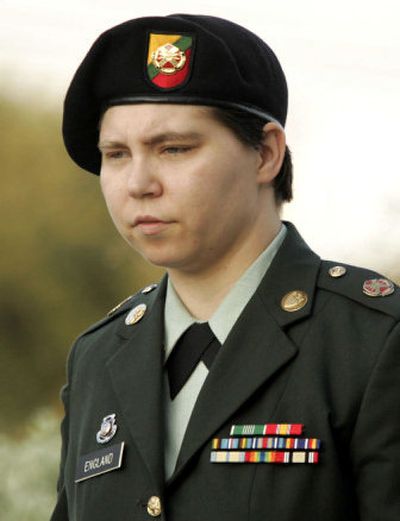Reservist gets three years in Iraq abuse case

WASHINGTON — Nearly two years after she posed for photographs with naked and shackled detainees in the dusty Abu Ghraib prison outside Baghdad, Pfc. Lynndie R. England was sentenced Tuesday to three years in prison and given a dishonorable discharge from the Army.
The sentence fell in the middle of the range of punishments meted out against the nine original Army reservists shown in photographs of abuse at the prison, with the “ringleader” of the abuse getting a 10-year sentence and one soldier who failed to report the maltreatment getting no jail time. Prosecutors had asked the jury of five officers that convicted England on Monday to sentence her to four to six years; the defense asked for no time at all.
England apologized Tuesday and told a military courtroom that she posed in the infamous photographs because her lover encouraged her. The Army reservist, who has been characterized by the defense as a young, impressionable soldier who would have done anything that former corporal Charles A. Graner Jr. asked, testified at her sentencing hearing at Ford Hood, Texas, that Graner had “used” her.
“After the photos were released, I’ve heard that attacks were made on U.S. armed forces because of them,” England said at the hearing, according to the Associated Press. “I apologize to coalition forces and all the families,” she said, also apologizing to “detainees, the families, America and all the soldiers.”
England, 22, of Fort Ashby, W.Va., has been at the center of the abuse scandal because she appeared in some of the most shocking photographs, including one in which she held a leash tied to a naked prisoner’s neck. Her defense attorneys have argued that she is being made a scapegoat for a broader policy of abuse that spread throughout the U.S. military in Iraq and Afghanistan. Top U.S. military officials have argued that the pictures inflamed the insurgency in Iraq.
England was convicted Monday of six of seven counts against her, most for posing in the incriminating photographs or for indecent acts. She is the ninth Army reservist who served at Abu Ghraib to be convicted at court-martial or to plead guilty to abuse charges.
Also Tuesday, an Army officer who has told members of Congress and a human rights group that vague policies from military leaders fomented abuse spoke publicly for the first time. Capt. Ian Fishback, 26, said in an interview that he believes the Army is examining his claims of command failures and unclear treatment guidelines mainly to punish low-ranking soldiers and not to explore whether top commanders bear responsibility.
Fishback, assigned to Fort Bragg, N.C., expressed frustration that Army investigators who have talked to him in the past week have focused almost entirely on identifying soldiers who spoke anonymously to Human Rights Watch. Fishback and two unidentified soldiers spoke of detainee abuse at bases in Afghanistan and Iraq, including instances in which detainees were severely beaten, pushed to exhaustion or humiliated.
“The way we have been treating detainees is immoral,” Fishback said. “We had a serious command climate problem, across the board. One of the things that infuriates me is that the leaders are not accepting responsibility.”
Defense Secretary Donald Rumsfeld said at a news briefing Tuesday that the Army is taking the allegations seriously. “And to the extent somebody’s done something that they shouldn’t have done, they’ll be punished for it,” Rumsfeld said. “And in any event, we’ll know the truth.”